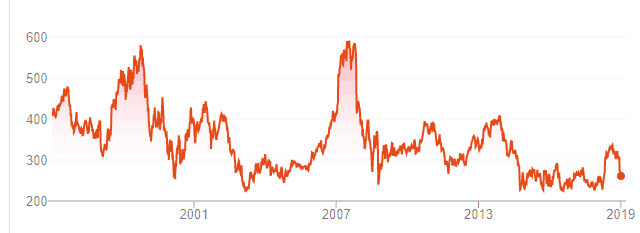What do investors want when they buy shares in J Sainsbury (LSE: SBRY)? My guess is that most shareholders hope for steady growth and a reliable dividend.
Sadly, Sainsbury’s has failed to deliver either of these benefits over last 20 years. Here’s how the stock has performed since 1999:
|
Date Should you invest £1,000 in Lloyds Banking Group Plc right now?When investing expert Mark Rogers has a stock tip, it can pay to listen. After all, the flagship Motley Fool Share Advisor newsletter he has run for nearly a decade has provided thousands of paying members with top stock recommendations from the UK and US markets. And right now, Mark thinks there are 6 standout stocks that investors should consider buying. Want to see if Lloyds Banking Group Plc made the list? |
Share price performance |
|
January 1999 – present |
-40% |
|
January 2004 – present |
-12% |
|
January 2009 – present |
-15% |
|
January 2014 – present |
-20% |
Although a few lucky investors have made money by buying during the dips and selling at short-term highs, the share price has delivered poor returns for many investors. Indeed, the shares have basically drifted lower since 1995, as this chart shows:

The dividend hasn’t been all that reliable either. The payout was cut by 50% in 2005. After regaining the lost ground, it was then cut again in 2015, 2016 and 2017. This year’s forecast payout of 10.7p per share is 38% less than the 2014 dividend of 17.3p.
What’s the problem?
Back in November, I explained why Sainsbury’s profit margins have continued to fall despite its acquisition of Argos. In short, most of the products sold by Argos appear to be even less profitable than groceries. So while sales have increased, profit margins have fallen.
Chief executive Mike Coupe hopes that a proposed deal to merge with Asda will solve the group’s problems. Combining the two would create a firm with sales to rival those of Tesco. The company estimates that cost savings and improved buying power could add £500m to earnings before interest, tax, depreciation and amortisation (EBITDA).
Sainsbury’s successful integration of Argos suggests that the firm might be able to pull off a complex merger with Asda. But this deal remains a risky and challenging project and has not yet gained regulatory approval.
In the meantime, Christmas trading was tough for the group. Despite recent falls, an uncertain future means that the supermarket’s shares look fully priced to me at the moment. I think there’s better value elsewhere.
Here’s one I’d buy
If you’re looking for a defensive income stock, then I think ingredients producer Tate & Lyle (LSE: TATE) could be a better buy.
The sweetener specialist’s dividend has been much more reliable than Sainsbury’s. As far as I can tell, Tate & Lyle’s payout has only been cut once since 1992. Even then, it was restored to its previous level after just one year.
The FTSE 250 firm’s share price has also performed better. Tate stock has risen by almost 75% over the last 10 years. Although the shares have fallen over the last five years, I believe this could be a buying opportunity.
A buy-and-forget stock
Rapid growth seems unlikely, but Tate & Lyle’s earnings have continued to inch ahead in recent years. Debt levels are low and cash generation is generally good.
The shares currently trade on 13 times forecast earnings, with a 4.5% yield. That looks like a decent buying level to me. I see this as a buy-and-forget stock that will provide a reliable income for many years to come.







